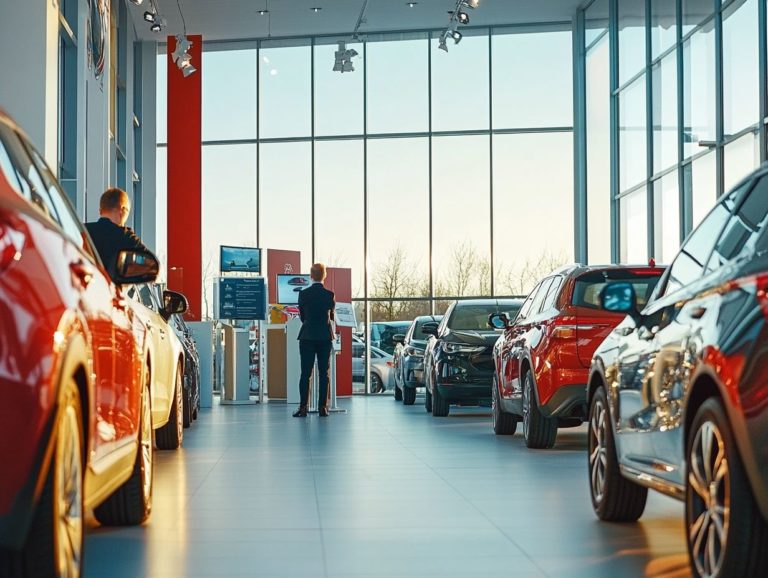Evaluating Trade-In Values for New Cars
When you’re looking to purchase a new car, understanding trade-in values is essential for maximizing your investment.
This article delves into the critical role trade-ins play in car purchases. It highlights various factors that affect their worth, including age, condition, and market demand.
You’ll find guidance on how to accurately determine your car’s trade-in value, along with savvy tips for negotiating with dealerships. We ll also explore alternatives like selling your car privately or donating it for potential tax benefits.
Whether you’re a seasoned buyer or stepping into this arena for the first time, knowing the ins and outs of trade-in values can really boost your buying power!
Contents
- Key Takeaways:
- Factors that Affect Trade-In Values
- Understanding the Role of Trade-Ins in Car Purchases
- How to Determine Your Car’s Trade-In Value
- Negotiating Trade-In Values with Dealerships
- Alternatives to Trading In Your Car
- Frequently Asked Questions
- How do I evaluate the trade-in value for a new car?
- Wondering what affects your car’s trade-in value?
- Can I negotiate the trade-in value for a new car?
- What should I do if I am not satisfied with the trade-in value offered by a dealership?
- Is it better to trade in my old car or sell it privately?
- How can I ensure I am getting a fair trade-in value for my new car?
Key Takeaways:

- Trade-in values play a crucial role in the overall cost of purchasing a new car. Understanding how they are determined and negotiating effectively can save you thousands of dollars.
- The age and condition of your car, as well as market demand and seasonal trends, are key factors that affect its trade-in value. Be aware of these factors and use them to your advantage.
- Before trading in your car, research its market value and consider any unique features that may increase its value. Don t hesitate to negotiate with dealerships to get the best deal possible.
Factors that Affect Trade-In Values
Recognizing the significance of trade-in values can profoundly influence your financial choices when acquiring a new vehicle. Trade-in value represents the amount a dealership or car broker is willing to pay for your current car, effectively helping to reduce the overall cost of your next purchase.
Trusted resources like Kelley Blue Book and Edmunds offer reliable estimates to support you in this endeavor. Additionally, learning how to evaluate new car resale value can help you understand your trade-in value, enabling you to negotiate more effectively and ensuring you secure the best possible price for your used car, especially in a market where buyer demand can fluctuate significantly.
The Importance of Trade-In Values
Trade-ins hold immense significance in your car-buying journey, as they can dramatically affect the overall cost and financial viability of acquiring a new vehicle. By allowing you to offset the price of your new car with the value of your old one, trade-ins can ease some of the financial burden that often accompanies upgrading to a newer model.
This interplay influences your immediate expenses and plays a crucial role in the vehicle’s depreciation the decrease in your car’s value over time and future resale value. Understanding the trade-in process is essential, particularly when you re working with a financial advisor to ensure you re making the most informed and advantageous decisions.
Collaborating with an expert can help you maximize the trade-in value and align it seamlessly with your broader financial objectives.
Understanding the Role of Trade-Ins in Car Purchases
Numerous factors come into play when determining trade-in values, such as the condition of your vehicle, its age, and the current market demand. Each of these elements can significantly impact the financial outcome of your trade-in decision, so it’s crucial to understand how to handle trade-ins when buying new and consider them carefully.
Age and Condition of the Car
The age and condition of your car play pivotal roles in determining its trade-in value. Older vehicles tend to depreciate more quickly and might benefit from a bit of detailing to enhance their curb appeal.
But it s not just about age; a well-maintained vehicle with comprehensive maintenance records can dramatically increase its appeal to potential buyers. When you present thorough documentation of regular service and repairs, you instill confidence in buyers regarding the vehicle s reliability.
Addressing minor repairs like fixing a scratch or replacing worn-out tires can elevate the car’s perceived quality even further. By investing in detailing services, you not only enhance the car’s visual appeal but also create a striking first impression.
This can lead to a trade-in offer that exceeds your expectations.
Ready to get the best deal for your trade-in? Let s dive in!
Market Demand and Seasonal Trends

Market demand and seasonal trends greatly affect trade-in values. These changes create opportunities that savvy sellers shouldn’t overlook.
By actively monitoring these fluctuations, you can pinpoint those peak moments when demand surges. This allows you to time your trade-ins for optimal financial benefit.
Understanding these patterns positions you to make informed decisions. This ensures you get better prices rather than settling for lower offers during quieter periods.
Recognizing which products or services gain traction at different times of the year enables you to strategize effectively. Ultimately, this enhances your returns on investment.
Armed with this knowledge, you can navigate the marketplace with confidence. This transforms insights into profitable transactions.
How to Determine Your Car’s Trade-In Value
To determine your car’s trade-in value, it’s essential to conduct thorough research. Utilize resources such as Kelley Blue Book and Edmunds, and don’t forget to pull up your car history report.
This will help you assess its worth accurately. You ll be ready to get the best value when it s time to trade in.
Researching Market Values
Researching current market values is crucial for understanding what to expect for your trade-in. Additionally, evaluating the true cost of a new car using trusted tools can help you obtain competitive quotes.
These platforms give you a baseline estimate and allow you to explore comparable vehicles based on make, model, year, and condition. By examining multiple listings, you can gain a clearer picture of what similar vehicles are selling for in today’s market.
Focusing on reliable resources significantly enhances the accuracy of your trade-in estimates. They are frequently updated with the latest sales data and valuation trends.
By cross-referencing multiple sources, you can make a more informed decision, ensuring that you secure a fair deal.
Considering Your Car’s Unique Features
Your car’s unique features like an automatic transmission, upgraded interior, and those extra options can significantly enhance its trade-in value.
When you highlight these characteristics during discussions with potential dealers, you pave the way for better offers. Features such as a premium sound system or advanced safety technologies not only elevate your driving experience but also broaden its appeal to a wider range of buyers.
Addressing interior repairs, like fixing minor scratches or giving the upholstery a thorough cleaning, can drastically improve perceived value. This shows dealers that the car has been well-maintained.
By presenting a well-documented maintenance history alongside these improvements, you create a compelling case that your vehicle is not just an ordinary trade-in but a truly desirable asset.
Negotiating Trade-In Values with Dealerships
Negotiating trade-in values with dealerships is crucial for getting the best price for your vehicle. This process enables you to make informed financial decisions that align with your goals.
Tips for Getting the Best Deal

To secure the best deal on your trade-in value, consider employing effective buyer strategies. Research your vehicle’s worth and solicit quotes from multiple dealerships.
Being aware of current market trends can significantly enhance your negotiation process. This enables you to confidently determine if the offers on the table are fair.
Preparation goes beyond merely gathering data about comparable vehicles. It also entails understanding the potential buyer’s weaknesses, which can serve as leverage during negotiations.
Recognize when a deal no longer helps you. Having a clear understanding of your minimum acceptable offer enables you to walk away if necessary, ensuring that you don t settle for anything less than your vehicle’s true value.
Alternatives to Trading In Your Car
Look at options other than trading in your car. Selling privately often gets you a better return, and donating can unlock valuable tax advantages.
Selling Your Car Privately
Selling your car privately can often net you a higher return than trading it in. You set the selling price based on your financial goals.
To position your car competitively, grasp the current market value of similar vehicles. Research online platforms, from automotive sites to community marketplaces, to gauge potential pricing strategies effectively.
Once you’ve established the price, it’s crucial to craft an enticing advertisement. Highlight your car s standout features, condition, and any recent maintenance performed. High-quality photos and a thorough description can truly elevate interest.
Act quickly! Engaging with potential buyers can significantly boost your chances of a successful sale.
Donating Your Car for Tax Benefits
Donating your car offers distinct advantages, especially regarding potential tax benefits that may surpass the financial return you’d get from trading it in at a dealership.
Many individuals overlook the significant deductions that charitable donations can provide on their tax returns. When you donate your vehicle to a nonprofit organization, you can typically claim the car’s fair market value on your taxes, especially if the organization sells it.
This approach supports a worthy cause and opens the door to possible tax savings that a simple trade-in may not provide. You can enhance your financial benefits while making a positive contribution to your community.
Frequently Asked Questions
How do I evaluate the trade-in value for a new car?

To evaluate the trade-in value for a new car, start by researching the make, model, and year of your vehicle. You can use online tools and resources to estimate its value based on condition and mileage, including a comprehensive understanding of trade-in value for used cars.
Additionally, getting quotes from multiple dealerships helps you compare and negotiate for the best trade-in value.
Wondering what affects your car’s trade-in value?
Factors affecting the trade-in value of a new car include its make, model, year, condition, mileage, and market demand. To maximize this value, it’s important to understand how to negotiate used car trade-ins. Features and upgrades, like technology and safety features, can also impact value.
Moreover, the time of year, current economic conditions, and location play a role in determining trade-in value.
Can I negotiate the trade-in value for a new car?
Yes, you can negotiate the trade-in value for a new car. It’s recommended to research your car’s value beforehand and get quotes from multiple dealerships.
This gives you a clearer picture of market value, allowing you to negotiate a fair trade-in value based on your car’s condition and demand.
What should I do if I am not satisfied with the trade-in value offered by a dealership?
If you’re not satisfied with the trade-in value from a dealership, try negotiating for a higher amount or consider selling your car privately.
Getting quotes from other dealerships can also help you find a better offer. Remember, the trade-in value is just one part of the overall car buying process; you can also learn how to evaluate new car deals effectively to negotiate a better deal on the new car.
Is it better to trade in my old car or sell it privately?
The decision to trade in or sell your old car privately depends on your preferences and situation. Trading in may be more convenient and hassle-free, but you might not get the highest value.
On the other hand, selling privately may take more time and effort, but you could secure a better price. Consider the pros and cons of each option and choose what works best for you.
How can I ensure I am getting a fair trade-in value for my new car?
To ensure a fair trade-in value for your new car, research its market value, get quotes from multiple dealerships, and learn about understanding the trade-in process for new cars to negotiate for a better offer.
You might also consider having your car appraised by a trusted mechanic or using reputable online tools to get an estimate of its value. Don’t hesitate to ask questions and negotiate for a fair trade-in value.






